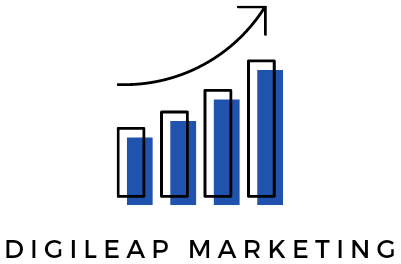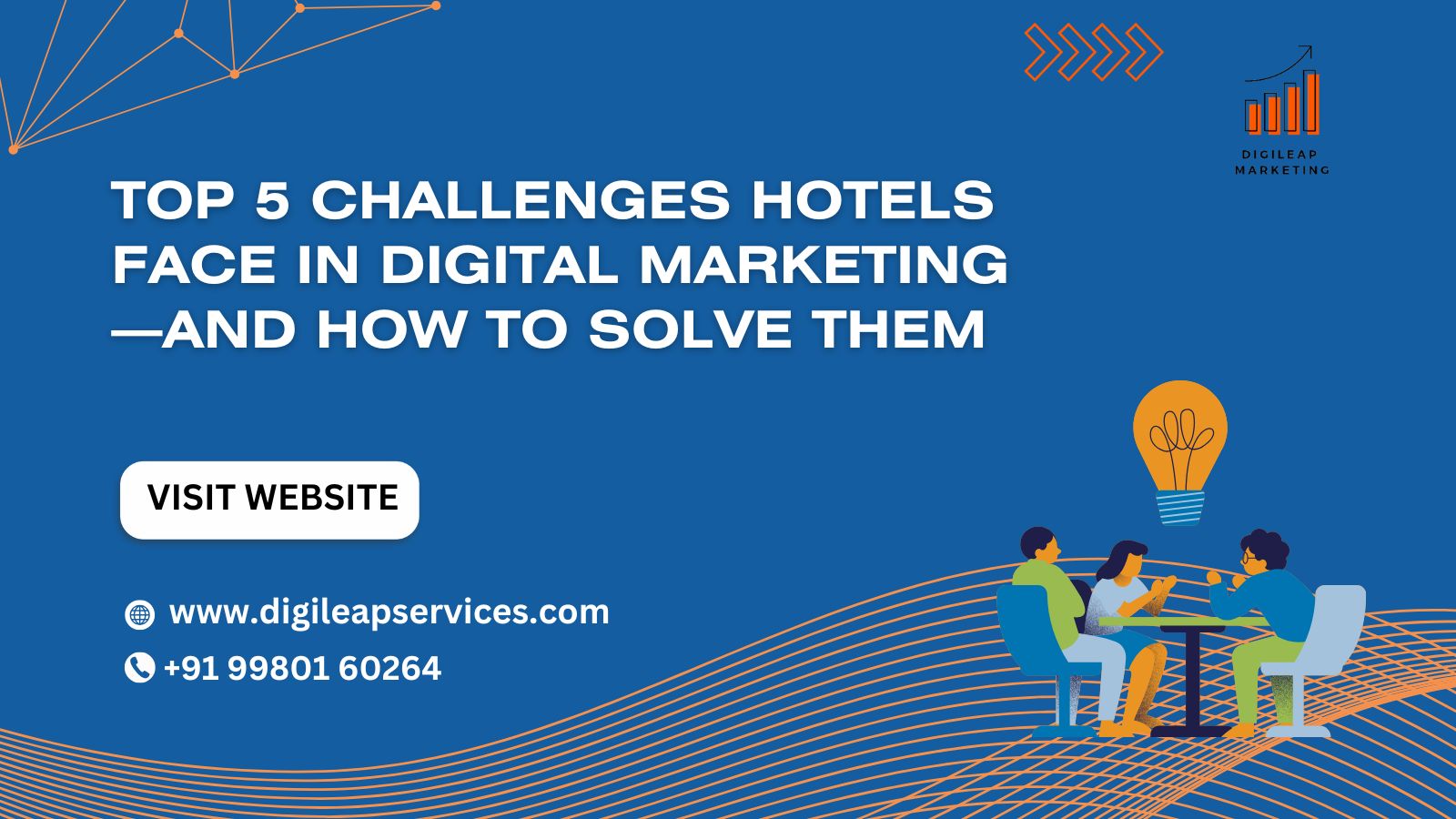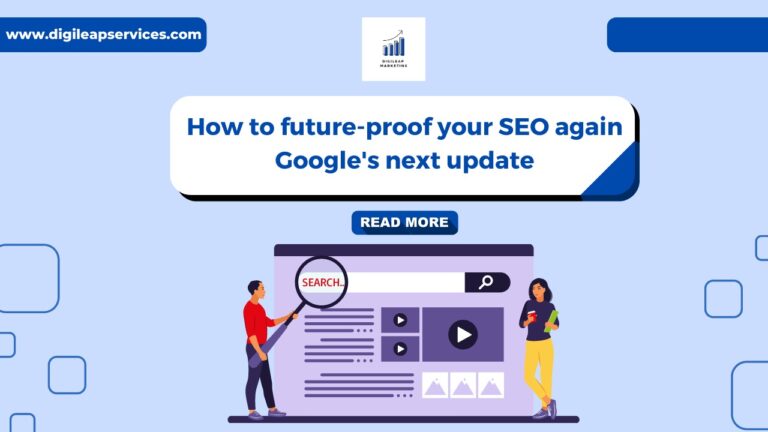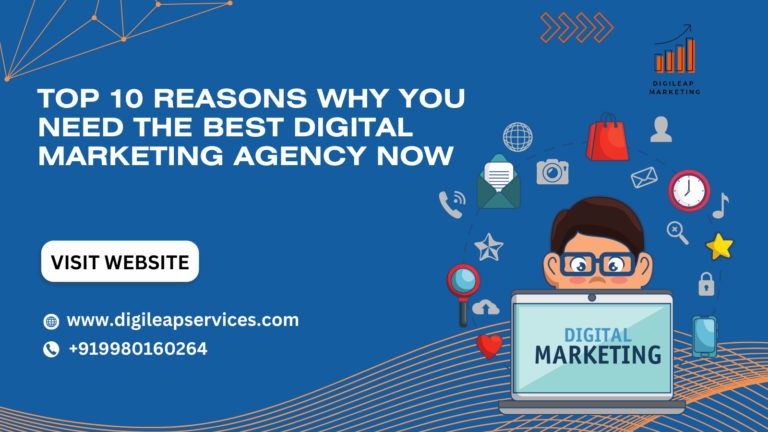Top 5 Challenges Hotels Face in Digital Marketing—And How to Solve Them
Introduction:
Let’s dive straight in—if you’re running a hotel (or you’re advising one), you already know that achieving bold hotel marketing in today’s fast-moving world is more complex than ever. Between guests scrolling past your offers, algorithms shifting beneath your feet, and budgets under pressure, there’s plenty to keep you awake at night. At the same time, there’s enormous opportunity, and with the right moves you can stand out. we at Digileap believe that every hotel can become a story worth sharing.)
In this piece, I’ll walk you through the five biggest challenges facing hotel marketers in 2025—plus practical, actionable fixes. We’ll talk real trends and real data (hello, Statista and industry research) and give you hearty, human advice—not jargon-laden fluff. Ready?
1: Hotel marketing Challenge – Visibility & Cut-Through
1.1: Oversaturated Channel Landscape
Hotels today are fighting for attention across metasearch, OTAs, social media, apps, and direct web. The noise is deafening. Even if you have a great offer, many guests never see it. A 2025 review of hotel-marketing trends notes that “fewer than 60% of searches now result in clicks” because users are overwhelmed.
1.2: OTT (Over-the-Top) Ad Costs & Diminishing Returns
Paid ads still matter—but the cost is going up, the click-throughs are going down, and ad-blockers are cropping up. So relying only on “boosted posts + PPC” is a shaky house.
1.3: Solution – Own Your Direct Channel
Here’s the fix: invest in direct-booking visibility and SEO. For example, optimize your website for “near me” + local language searches, embed schema for room rates, and use metasearch wisely. In India the data is clear: hotel-related searches hit 1,424 lakh in FY2025, with emergent Tier 2/3 cities driving fast growth. Techmagnate
So: refine your site, lean into local/vernacular search, and turn your “book direct” narrative into a value proposition. That gives you visibility
2: Hotel marketing Challenge – Personalisation & Data
2.1: Guests Expect Tailored Experiences
These days travellers are less surprised by “standard room with breakfast” and more enticed by “we remember your veg preference” or “upgrade because you stayed before.” In 2025, hyper-personalization is front and center. Hospitality Net
2.2: Data Privacy / Third-Party Cookie Phase-Out
Marketing used to lean on third-party cookies and broad retargeting. That’s dying. Hotels must now invest in first-party data (guests you know) and consent-driven insights.
insights.ehotelier.com
2.3: Solution – Build the Guest Profile & Use AI
Practical move: create a unified guest-data platform (or CRM) that pulls website behavior, booking history, loyalty status, and feedback. Then use AI (or simple segmentation) to deliver offers, e.g., “business guest arriving Sunday = free WiFi upgrade + late check-out.”
In fact, research shows that hotels using data and personalization boost guest satisfaction noticeably.
So: treat your data like gold, not just for the next email blast, but for a real guest experience.
3: Hotel marketing Challenge – Content & Engagement
3.1: Video, Short-Form, and Story-Led Content Dominance
In 2025, the rule is: if you’re not producing engaging visual content you’ll get left behind. Short-form video, TikTok, Reels—guests scroll, stop, click, book. To quote a trend piece: “social media will be a key driver of guest engagement and bookings.”
3.2: Authenticity vs. “Perfect” Marketing
It’s no longer enough to show pristine hotel sprites and overly staged images. Guests crave authenticity—behind-the-scenes, local experience, real people, and real stories.
3.3: Solution—Tell Stories, Make It Shoppable
Here’s the deal: shift from product promo to story promo. For example: feature a concierge guiding guests to a hidden local cafe; show a short-form tour of the rooftop sunset, and share guest-UGC (user-generated content) curated from a stay. Also, consider “shoppable” posts on Instagram or Facebook—“book now” directly from story or feed. According to a hotel-marketing playbook, social commerce is expected to contribute ~17% of digital transactions by 2025.
So: invest in good visuals (not necessarily Hollywood-budget), tell genuine stories, and make it easy for guests to act.
4: Hotel Marketing Challenge – Technology & Integration
4.1: Tech Stack Chaos & Costs
Many hotels run separate systems: booking engine, PMS, CRM, website CMS, loyalty program, and social dashboards. Integration often fails, leading to wasted data, duplicated effort, and a fragmented guest experience. A study found that the main constraints in hospitality digital transformation are system integration, staff training, and initial investment.
4.2: Rapidly Changing Guest Tech Expectations
Guests expect a seamless experience: mobile check-in, digital room keys, chatbots, and personalized in-room tech. If you don’t deliver, you lose against those who do.
4.3: Solution – Prioritise Systems & Training
What to do: pick your core tech stack and integrate it. For example, your website, booking engine, and CRM should “talk.” Then train your team to use it—not just hand it off to “IT.” Also keep scalability in mind: as you grow (or add properties), the tech must scale.
Investment here = long-term payoff: better data, better guest experience, and lower operational friction.
5: Hotel Marketing Challenge – Reputation & Trust
5.1: Online Reviews & Social Proof Influence
Your reputation online can be the difference between booking and bounce. According to one playbook, “90% of consumers trust online reviews and 97% read them before booking”.
5.2: Negative Feedback Spreads Fast
A bad guest experience, posted publicly, can erode trust not just for that guest but through social channels, and it takes more effort to recover than it does to maintain.
5.3: Solution – Proactive Review Management + Ambassadors
Action steps: after each stay, send a friendly email asking for feedback (before they go tothe public review site). Respond quickly to any issue: publicly if necessary, privately always. Use happy guests as brand ambassadors: share their UGC and loyalty stories, and ask for teases and tags. Build a culture of trust.
In short: reputation is now a major marketing asset—treat it as such.
Conclusion
Alright—so we’ve walked through the five key challenges for hotel marketing in 2025: visibility & cut-through, personalization & data, content & engagement, technology & integration, and reputation & trust. None of these are trivial—but none are intractable either. With thoughtful planning, investment, and a guest-first mindset, you can leap ahead.
If you’re looking for a modern partner who understands these nuances and works alongside your team (yes, that’s us at Digileap), you’re not alone in this journey.
In a world where guest expectations shift rapidly, the hotels that win will be the ones that adapt fast, tell real stories, make direct booking effortless, and consistently deliver a trusted experience.
For more insights, visit our services page
.
TL;DR:
Visibility challenge? Boost SEO, local/vernacular search, and direct channel.
Personalization challenge? Own first-party data, segment guests, and use AI.
Content challenge? Invest in authentic, short-form, story-led visuals.
Tech challenge? Integrate your stack, train your team, and scale.
Reputation challenge? Proactively manage reviews and build ambassadors.
Do this and you’ll move from “just another hotel ad” to “booked stay remembered.”












